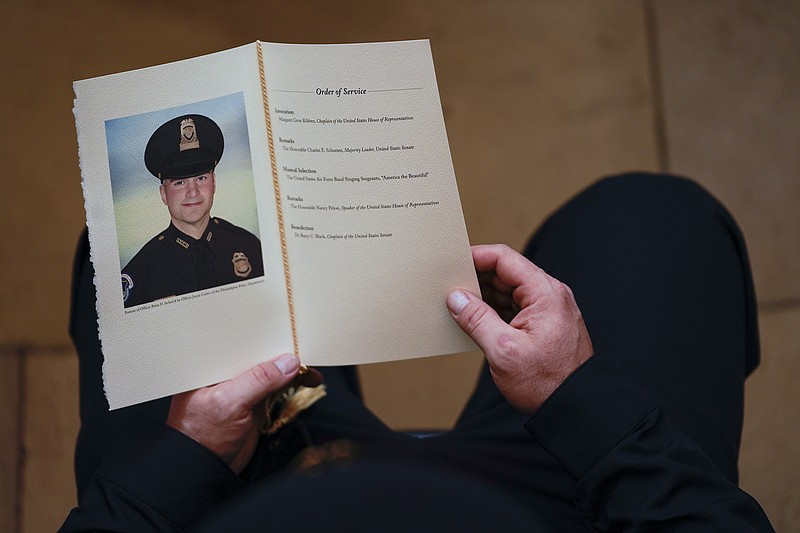WASHINGTON -- Capitol Police Officer Brian Sicknick, who was injured while confronting rioters during the Jan. 6 insurrection, suffered a stroke and died from natural causes, the Washington medical examiner's office ruled Monday, a finding that lessens the chances that anyone will be charged in his death.
Investigators initially believed the officer was hit in the head with a fire extinguisher, based on statements collected early in the investigation, according to two people familiar with the case. And they later thought the 42-year-old Sicknick may have ingested a chemical substance -- possibly bear spray -- that may have contributed to his death.
But the determination of a natural cause of death means the medical examiner found that a medical condition alone caused his death -- it was not brought on by an injury. The determination is likely to significantly inhibit the ability of federal prosecutors to bring homicide charges in Sicknick's death.
U.S. Capitol Police said that the agency accepted the medical examiner's findings but that the ruling didn't change the fact that Sicknick had died in the line of duty, "courageously defending Congress and the Capitol."
"The attack on our officers, including Brian, was an attack on our democracy," police officials said in a statement. "The United States Capitol Police will never forget Officer Sicknick's bravery, nor the bravery of any officer on January 6, who risked their lives to defend our democracy."
Federal prosecutors have charged two men with using bear spray on Sicknick during the Jan. 6 riot. The arrests of George Tanios, 39, of Morgantown, W.Va., and Julian Khater, 32, of Pennsylvania, were the closest federal prosecutors have come to identifying and charging anyone associated with the five deaths that happened during and after the riot.
Lawyers for the two men had no immediate comment Monday.
Sicknick died after defending the Capitol against the mob that stormed the building as Congress was voting to certify Joe Biden's electoral win over Donald Trump. It came after Trump urged his supporters to "fight like hell" to overturn his defeat.
Sicknick was standing guard with other officers behind metal bicycle racks as the mob descended on the Capitol.
As the rioters began pulling on one of the racks, Khater was seen with his arm in the air and canister of chemical spray in his hand while standing just 5 to 8 feet from the officers, authorities said.
In February, Sicknick became only the fifth person in history to lie in honor in the Capitol Rotunda, a designation for those who are not elected officials, judges or military leaders. He was interred at Arlington National Cemetery.
Separately, a federal judge on Monday ordered two leaders of the far-right Proud Boys extremist group to be arrested and jailed while awaiting trial on charges they planned and coordinated an attack on the Capitol.
Joseph Biggs and Ethan Nordean had been free since their March 10 indictment, but U.S. District Judge Timothy Kelly concluded that the two men are dangerous and no conditions for their release could be adequate. The judge said Biggs and Nordean "facilitated political violence" even if they weren't armed and didn't assault anybody at the Capitol on Jan. 6.
Kelly overruled another federal judge in Washington who had ordered pre-trial home confinement for Nordean. Biggs was freed after his initial Jan. 20 arrest in his home state of Florida. Justice Department prosecutors initially didn't seek to keep Biggs jailed but last month asked for his pre-trial release to be revoked, saying new evidence shows he poses a "grave danger" to the community.
Biggs and Nordean are among more than two dozen Capitol riot defendants who have been described by federal authorities as Proud Boys leaders, members or associates.
Last month's indictment charged Biggs, Nordean and two other men described as Proud Boys leaders with conspiring to impede Congress' certification of the Electoral College vote. Other charges in the indictment include obstruction of an official proceeding, obstruction of law enforcement during civil disorder and disorderly conduct.
Zachary Rehl and Charles Donohoe are charged in the same indictment as Biggs and Nordean and have been jailed since their arrests in March.
Information for this article was contributed by Alanna Durkin Richer and Michael Kunzelman of The Associated Press.

